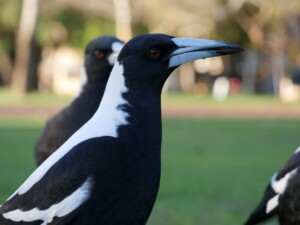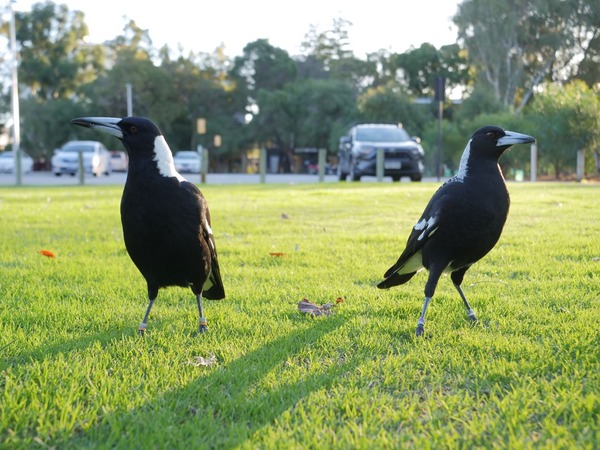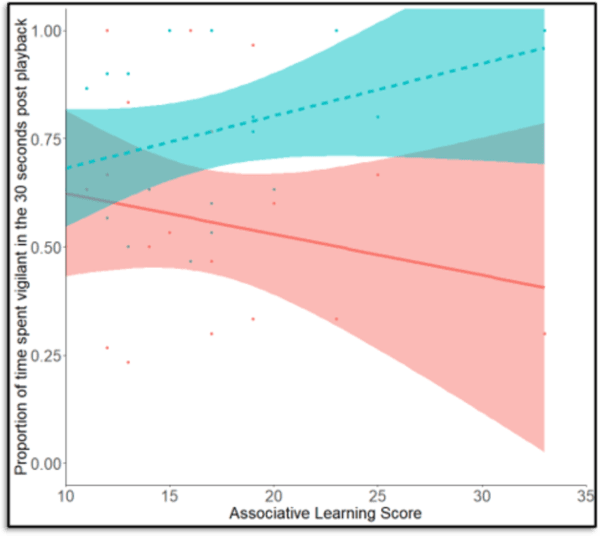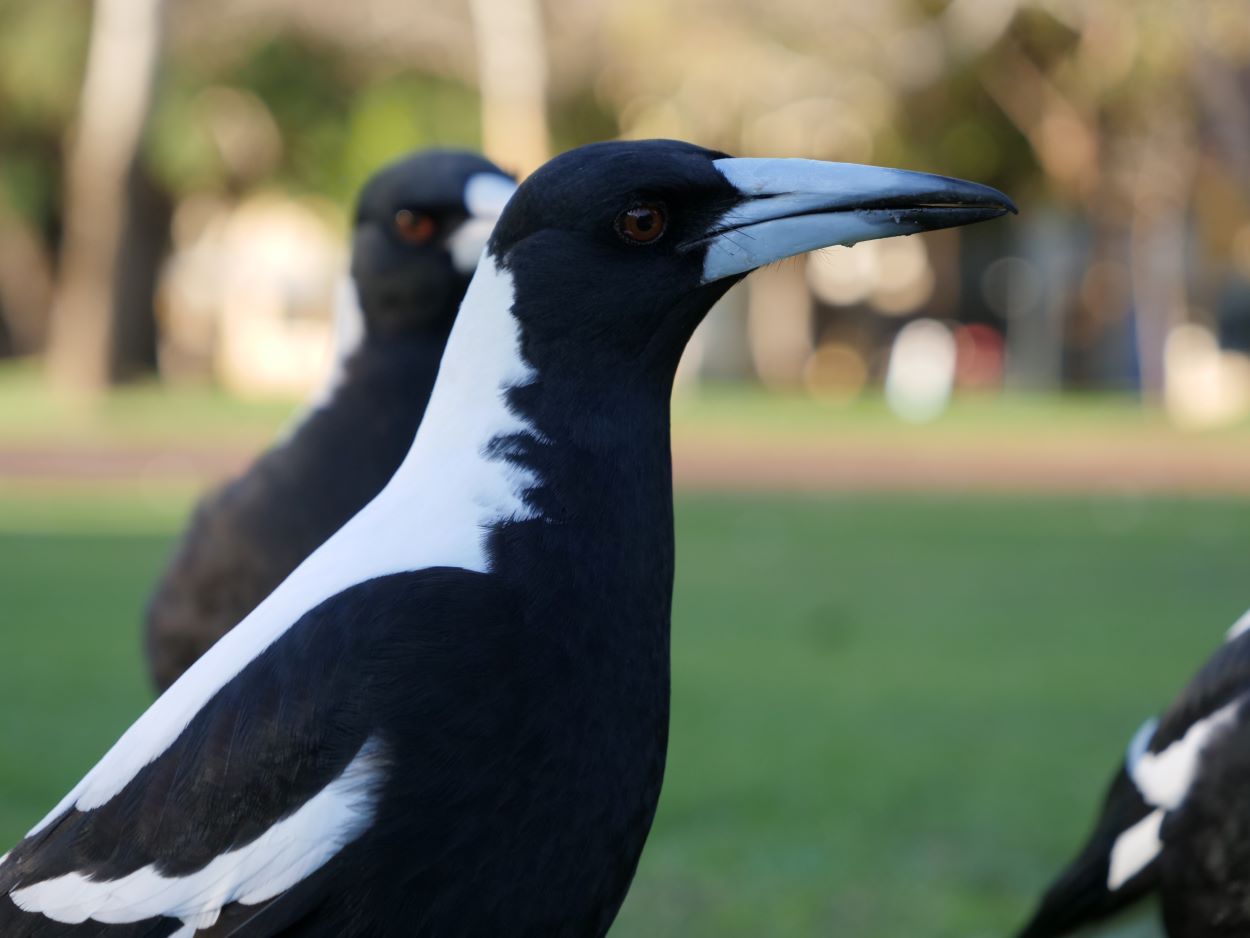LINKED PAPER  Cognition mediates response to anthropogenic noise in wild Western Australian magpies (Gymnorhina tibicen dorsalis). Blackburn, G., Ashton, B.J., Thornton, A., Woodiss-Field, S., Ridley, A. 2023. Global Change Biology. DOI: 10.1111/gcb.16975. VIEW
Cognition mediates response to anthropogenic noise in wild Western Australian magpies (Gymnorhina tibicen dorsalis). Blackburn, G., Ashton, B.J., Thornton, A., Woodiss-Field, S., Ridley, A. 2023. Global Change Biology. DOI: 10.1111/gcb.16975. VIEW
Anthropogenic noise refers to any noise generated by human activities and is rapidly increasing as the human population grows and expands (Shannon et al. 2016). From alterations to species abundance and richness, to changes in communication and behaviour, the effects of anthropogenic noise on wildlife are far-reaching and well documented (Shannon et al. 2016; Kunc & Schmidt 2019).

Figure 1. Western Australian magpies in an urban parkland of WA © James Blackburn.
Anthropogenic noise and the anti-predator response
One important aspect of animal life that is affected by anthropogenic noise is alarm calling and the anti-predator response. Many species, in particular birds and mammals, produce alarm calls to warn others of danger. The ability to appropriately respond to alarm calls is quite literally a matter of life or death. A study by Zhou et al. (2019) on superb fairy-wrens found that when an alarm call was played by itself, 93% of birds fled to cover. However, when these researchers added 58 decibels of noise (about the same amplitude or loudness as you experience in most office settings) to this alarm call, none of the 16 fairy-wrens tested fled to cover. This reduction in anti-predator response when anthropogenic noise is present may either be because individuals cannot properly hear alarm calls in noise, or because individuals are distracted or stressed by the presence of noise.
Considering sources of individual variation
Most research to date has documented how entire populations or species respond to anthropogenic noise, rather than considering how individuals may differ in their response to noise. A recent review by Harding et al. (2019) suggested individual factors may affect how individuals respond to anthropogenic noise. They suggested factors such as environmental context (animals may be more sensitive to the effects of noise during breeding, or when resources are scarce), prior exposure to noise, sex, age, and dominance status may affect how individuals respond to anthropogenic noise. Another factor that varies amongst individuals and may affect how well they can cope with anthropogenic noise is cognition. Cognition refers to the ways in which individuals perceive, process, store, and react to environmental information (Shettleworth 2001). Researchers who study animal cognition believe that cognition may underpin how animals respond to man-made stressors such as anthropogenic noise (Potvin 2017; Lee & Thornton 2021). Cognitive processes such as learning and memory may help individuals to make behavioural decisions that mitigate the negative effects of anthropogenic noise. With regards to the anti-predator response, for instance, birds may benefit from maintaining their normal response to an alarm call even when noise is present. Learning from and being able to recall previous experiences with anthropogenic noise may help them to do this.
In this study, we used playback experiments and cognitive testing to investigate how magpies respond to anthropogenic noise, and to determine if cognition can help magpies respond to and cope with anthropogenic noise.
Can cognition help magpies respond to man-made noise?
We found that when loud anthropogenic noise was added to an alarm call, magpies were less likely to flee to cover, and were less vigilant, compared to when an alarm call was played by itself. Furthermore, we found that individuals that performed better in a cognitive task exhibited a more similar response to an alarm call by itself and an alarm call with plane noise, when compared to worse performing individuals, suggesting these smarter birds were more able to maintain their normal response to alarm call when noise was present.

Figure 2. The time spent vigilant post playback following the alarm only (blue dashed line) and alarm + anthropogenic noise (pink solid line) of birds with different associative learning scores (lower associative learning scores indicate better cognitive performance).
These individuals with better cognitive abilities may be better at maintaining their normal anti-predator response as they are more able to appropriately associate alarm calls with danger, even in the presence of noise. Alternatively, these individuals may be better at processing multiple sources of information (i.e. both anthropogenic plane noise, and alarm call), when compared to birds that are less cognitively adept. Regardless of why this effect is seen, the results here suggest that cognition is an important factor that may aid individuals in responding to anthropogenic stressors such as noise. Findings from our study provide some of the first empirical evidence linking cognitive performance to the response of individuals to anthropogenic noise, and highlight the importance of exploring individual factors that may affect how individuals respond to stressors such as noise.
References
Harding, H. R., Gordon, T. A. C., Eastcott, E., Simpson, S. D., & Radford, A. N. 2019. Causes and consequences of intraspecific variation in animal responses to anthropogenic noise. Behavioral Ecology 30:6. VIEW
Kunc, H. P., & Schmidt, R. 2019. The effects of anthropogenic noise on animals: a meta-analysis. Biology Letters 15:11. VIEW
Lee, V. E., & Thornton, A. 2021. Animal cognition in an urbanised world. Frontiers in Ecology & Evolution 9. VIEW
Potvin, D. A. 2017. Coping with a changing soundscape: avoidance, adjustments and adaptations. Animal Cognition 20:1. VIEW
Shettleworth, S. J. 2001. Animal cognition and animal behviour. Animal Behaviour 61:2. VIEW
Shannon, G., McKenna, M. F., Angeloni, L. M., Crooks, K. R., Fristrup, K. M., Brown, E., Warner, K. A., Nelson, M. D., White, C., Briggs, J., McFarland, S., & Wittemyer, G. 2016. A synthesis of two decades of research documenting the effects of noise on wildlife. Biological Reviews of the Cambridge Philosophical Society 91:4. VIEW
Zhou, Y., Radford, A. N., & Magrath, R. D. 2019. Why does noise reduce response to alarm calls? Experimental assessment of masking, distraction and greater vigilance in wild birds. Functional Ecology 33:7. VIEW
Image credit
Top right: Western Australian Magpie © James Blackburn.




